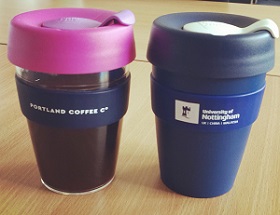September 13, 2018, by sustainablenottingham
WasteNott – What actually happens to our waste?
An interview with Wastecycle – the University of Nottingham’s waste contractor
What is Wastecycle?
Wastecycle (soon to become ‘Enva’) is the current waste contractor for the University of Nottingham. We manage all of the general waste and recycling that comes out of the onsite bins and skips at the University and take it to a site in Colwick for sorting. This means removing and processing around 3,000 tonnes of waste a year from the University.
In fact, Wastecycle manages the East Midlands Universities Waste Consortium (EMUWC) – which means we handle waste from the University of Nottingham, Nottingham Trent University, Loughborough University and the University of Leicester.
Wastecycle is currently in the process of transitioning to ‘Enva’. However the heart of the company, our processes and ethos remain the same.
How does Wastecycle focus on sustainability?

Waste hierarchy – most preferable to least preferable option
We focus heavily on recycling and recovery so that less waste ends up in landfill or as litter on land or in waterways. Potential side effects of landfill include harm to wildlife, disease issues and carbon emissions, all of which we seek to avoid. That is why more than 95% of the waste collected is diverted from landfill and reused, recycled or used for energy recovery, focusing on the waste hierarchy (see right).
Our aspiration is to send zero waste to landfill, and to drastically increase the amount of waste recycled: we need to work with students and staff to achieve that.
How do you process plastic waste from the University of Nottingham?
We ask that students and staff place all clean plastics into the recycling bins on site. Once they have been collected, waste is sorted using a blend of mechanical sorting and hand sorting. The key process to sort plastics from other waste is the use of an infrared detection system which uses a series of air jets.
Recyclable plastics (common examples include drinks bottles and plastic food boxes) are processed into plastic flake and transformed into recycled plastic products including containers and garden furniture.
What’s one thing we could all do better?
This academic year we want to raise awareness around recycling best practice and promoting reusable plastics instead of single-use. For example, did you know that the majority of disposable coffee cups are not recyclable and should go in general waste? Intrinsically, disposable cups are difficult and expensive to recycle as they are paper with a tightly bound plastic lining which is very difficult to separate.
 Where coffee cups have been put in the wrong bin, they can contaminate other recyclable materials in the waste stream, such as paper, meaning the whole load is no longer suitable for recycling.
Where coffee cups have been put in the wrong bin, they can contaminate other recyclable materials in the waste stream, such as paper, meaning the whole load is no longer suitable for recycling.
Millions of disposable cups are thrown away everyday across the UK, and currently every year the University throws away over 1.1 million cups. There are things we all can do to cut down waste – such as using a reusable Keep-Cup.
These actions link in with the Sustainable Development Goal on Responsible Consumption and Production, which encourages people to be more aware about what they buy, use and throw away.
How can we learn more?
 Please contact us on East.MidlandsUniversities@enva.com if you have any questions or for updates on our progress to improve your recycling!
Please contact us on East.MidlandsUniversities@enva.com if you have any questions or for updates on our progress to improve your recycling!
This blog is part of WasteNott – reducing single-use plastic waste across our campuses.
No comments yet, fill out a comment to be the first

Leave a Reply